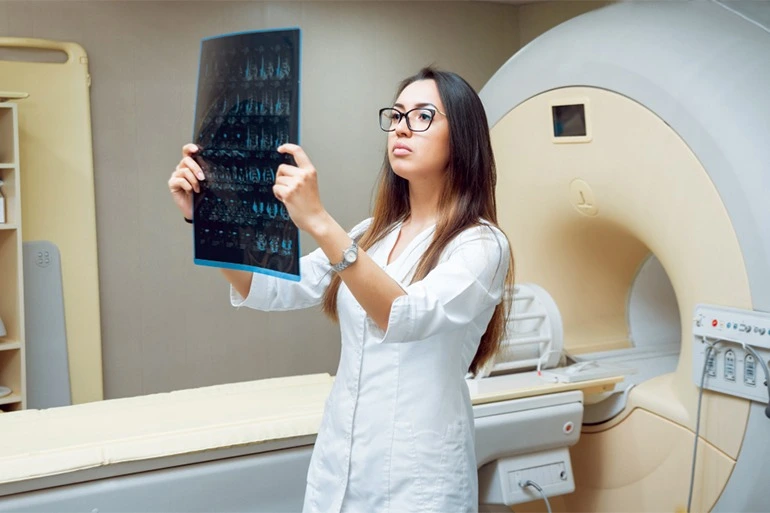Latest Notifications

Blog

How a B.Sc. in Radiology & Imaging Technology Can Shape Your Future
If you want a career combining advanced technology with patient care and with the potential for major growth, B.Sc. in Radiology & Imaging Technology course might be the best for you. We are committed to delivering the Best B.Sc. in Radiology & Imaging Technology in West Bengal, empowering our students with the drive and tools to succeed in this vital healthcare career.
What is Radiology & Imaging Technology?
Radiology and Imaging Technology is a specialist healthcare area utilizing a range of imaging procedures to generate precise visual representations of the interior of the human body. These images are vital to diagnosing illnesses, tracking the success of treatment, and directing medical interventions. Working as a radiology and imaging technologist places you at the forefront of the diagnostic process, conducting advanced equipment and playing an integral role in patient care.
The discipline includes a variety of modalities, ranging from:
- Radiography (X-ray): The most prevalent imaging method, utilized in the study of bones, fracture detection, and visualization of some organs.
- Computed Tomography (CT Scan): A refined X-ray method creating cross-sectional images of the body, providing enhanced views of organs, soft tissues, and bones.
- Magnetic Resonance Imaging (MRI): Creates clear images of organs, soft tissues, bone, and almost all other body structures using powerful magnetic fields and radio waves. It's especially valuable for brain, spinal cord, and joint imaging.
- Ultrasound (Sonography): Uses high-frequency sound waves to generate real-time images of the body's internal organs, blood vessels, and the fetus in pregnancy.
- Nuclear Medicine: Uses small quantities of radioactive substances to diagnose and treat a range of diseases, such as cancers, heart disease, and abnormalities.
Increased Demand for Radiologic & Imaging Technologists
The healthcare industry in India, and particularly in West Bengal, is witnessing considerable growth. This growth, along with improvements in the area of medical technology and a rising emphasis on early and precise diagnosis, has resulted in a steady and rising demand for competent radiology and imaging personnel. Hospitals, diagnostic centers, research organizations, and even teleradiology services are in pursuit of qualified professionals.
The demand for expert technologists is further underscored by the existing radiologist-to-patient ratio in India, which leaves a lot to be desired. This increased demand finds expression in career opportunities and stability for a B.Sc. in Radiology & Imaging Technology graduates. The industry is also undergoing development with the inclusion of artificial intelligence (AI) and other technological advancements, opening new opportunities for specializations and career growth.
Why Study a B.Sc. in Radiology & Imaging Technology?
Aside from the robust employment market, a B.Sc. in Radiology & Imaging Technology has a number of compelling benefits:
- Career Impact: You directly contribute to the diagnosis and treatment of patients, leading to successful outcomes.
- Technical Proficiency: The program includes hands-on exposure to advanced equipment and insights regarding intricate principles of medical imaging.
- Work Settings Vary: Graduates can work in a wide range of healthcare settings, from large multi-specialty hospitals to specialized diagnostic centers and research organizations.
- Continuous Learning: Medical imaging is a constantly evolving field with new technology and new techniques constantly being developed, providing opportunities for ongoing learning and professional growth.
- Competitive Salary Potential: With experience and specialisation, these professionals are capable of earning competitive salaries.
Career Opportunities After Graduation
A B.Sc. in Radiology & Imaging Technology provides opportunities to pursue a broad range of career avenues:
- Radiography/Radiologic Technologist: Main occupation consisting of the operating of X-ray, CT, and MRI apparatus to create diagnostic images.
- MRI Technician: These professionals operate MRI scanners and aid in MRI procedures.
- CT Technologist: Responsible for conducting CT scans and maintaining image quality.
- Ultrasound Technician/Diagnostic Medical Sonographer: Is responsible for performing ultrasound scans.
- Nuclear Medicine Technologist: Uses radioactive substances to conduct diagnostic scans and aid in treatments.
- Application Specialist: Is employed by companies manufacturing medical equipment, and offers support and training on imaging systems.
- Clinical Instructor: Provides education and trains new radiologic and imaging technology students.
- Research Assistant: Contributes to one or more research projects designed to improve imaging procedures and diagnostic approaches.
- PACS Administrator: Oversees Picture Archiving and Communication Systems (PACS) to store and transfer digitized images.
After further specialization and postgraduate education (e.g., M.Sc. in Medical Imaging Technology), graduates can advance to careers in advanced imaging, academia, research, and leadership roles in healthcare organizations.
A Bachelor of Science in Radiology & Imaging Technology from Haldia Institute of Health Sciences can form the cornerstone of a rewarding and successful career in the fast-paced and vital healthcare industry. Join us to become an integral member of the medical diagnostic framework, leaving a real impact on patient lives. Contact us for more information.

